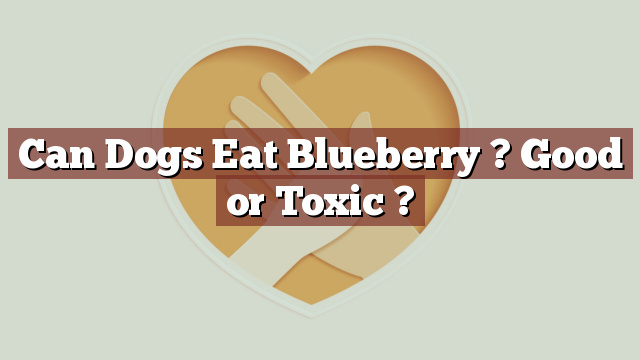Can Dogs Eat Blueberries? Good or Toxic?
As responsible pet owners, it is crucial to be aware of what foods are safe for our furry friends. The question, can dogs eat blueberries?, often arises when we are enjoying these delicious berries ourselves. To ensure the well-being of our canine companions, it is essential to understand the nutritional value, safety, and potential risks of feeding blueberries to dogs.
Nutritional Value of Blueberries for Dogs
Blueberries are not only a tasty treat for humans but can also provide several nutritional benefits for our four-legged friends. These small berries are packed with vitamins C and K, fiber, and antioxidants. Antioxidants help fight against harmful free radicals and can boost the immune system. Additionally, blueberries are low in calories and fat, making them a healthy snack option for dogs.
Can Dogs Eat Blueberries? Safety and Toxicity
The good news is that dogs can eat blueberries without any major risks. Blueberries are non-toxic to dogs and are generally considered safe for consumption. In fact, many pet food manufacturers include blueberries in their recipes due to their nutritional value. However, it is important to note that every dog is different, and some may have allergies or sensitivities to certain foods, including blueberries. Therefore, it is always recommended to introduce new foods gradually and monitor your dog for any adverse reactions.
Potential Risks and Benefits of Blueberries for Dogs
While blueberries are generally safe for dogs to eat, there are a few potential risks and benefits to consider. On the positive side, the high antioxidant content in blueberries can help prevent cell damage and promote overall health in dogs. They may also support brain function and reduce the risk of certain chronic diseases.
However, it is essential to feed blueberries in moderation as excessive consumption can lead to digestive issues such as diarrhea or upset stomachs. Additionally, the high sugar content in blueberries can be a concern for dogs with diabetes or weight management issues. Therefore, it is crucial to feed blueberries as a part of a balanced diet and not as a primary food source.
What to Do If Your Dog Eats Blueberries
If your dog accidentally consumes a few blueberries, there is generally no cause for concern. However, if your dog ingests a large quantity or experiences any unusual symptoms, it is best to consult your veterinarian. They can provide expert advice and guidance based on your dog’s individual health needs.
Conclusion: Blueberries Can Be a Safe and Beneficial Treat for Dogs
In conclusion, dogs can eat blueberries as they are generally safe and offer several nutritional benefits. Their high antioxidant content and low-calorie nature make them a healthy addition to your dog’s diet. However, it is important to feed blueberries in moderation and be aware of any potential allergies or sensitivities your dog may have. As always, consulting with a veterinarian is recommended if you have any concerns about your dog’s diet or health. With proper care and moderation, blueberries can be a safe and enjoyable treat for your canine companion.
Thank you for investing your time in exploring [page_title] on Can-Eat.org. Our goal is to provide readers like you with thorough and reliable information about various dietary topics. Each article, including [page_title], stems from diligent research and a passion for understanding the nuances of our food choices. We believe that knowledge is a vital step towards making informed and healthy decisions. However, while "[page_title]" sheds light on its specific topic, it's crucial to remember that everyone's body reacts differently to foods and dietary changes. What might be beneficial for one person could have different effects on another. Before you consider integrating suggestions or insights from "[page_title]" into your diet, it's always wise to consult with a nutritionist or healthcare professional. Their specialized knowledge ensures that you're making choices best suited to your individual health needs. As you navigate [page_title], be mindful of potential allergies, intolerances, or unique dietary requirements you may have. No singular article can capture the vast diversity of human health, and individualized guidance is invaluable. The content provided in [page_title] serves as a general guide. It is not, by any means, a substitute for personalized medical or nutritional advice. Your health should always be the top priority, and professional guidance is the best path forward. In your journey towards a balanced and nutritious lifestyle, we hope that [page_title] serves as a helpful stepping stone. Remember, informed decisions lead to healthier outcomes. Thank you for trusting Can-Eat.org. Continue exploring, learning, and prioritizing your health. Cheers to a well-informed and healthier future!

